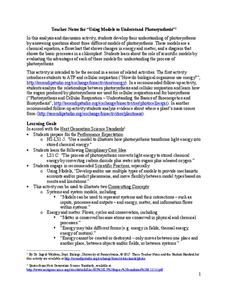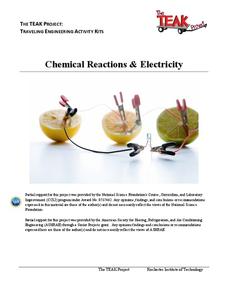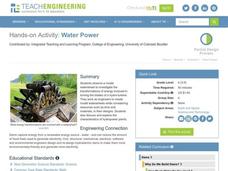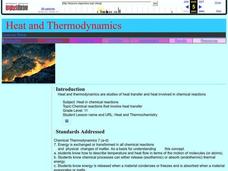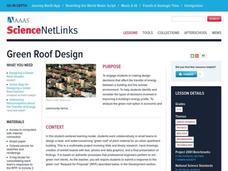Purdue University
Rock Steady: Designing a Sensor
Bridge young mathematicians' knowledge of engineering and design. Pupils use two desks and a plastic sheet to simulate a bridge. After learning about energy transformations, they use available materials to design a sensor that detects...
Space Awareness
Let's Break the Particles
Build learning by breaking atoms! Young scientists study the way energy changes with a hands-on activity. As they roll steel marbles down a ramp, learners test the hypothesis that kinetic energy does not go away with friction or...
Serendip
Photosynthesis and Cellular Respiration
How does energy from the sun make plants grow? Scholars move step by step through the processes that promote plant propagation during a detailed lesson. The resource illustrates ADP production and hydrolysis, then allows learners to...
Clarkson University
Forms, States, and Conversions
Searching for a way to integrate multiple concepts of energy conversion while captivating a middle school audience? This activity presents topics related to potential and kinetic energy and offers the ability to allow pupil interaction.
Magic of Physics
Franklin's Lab
Get energized! Circuitry scholars follow the path of energy from its beginnings as a fossil fuel all the way to bulbs and batteries using an interesting interactive. Groups or individuals help Ben Franklin discover how to convert and...
Serendip
Using Models to Understand Photosynthesis
Is your class in the dark about photosynthesis? Shed some sunlight on an important biological process with a thoughtful activity. After answering questions to help determine their level of knowledge, learners work with chemical equations...
Norwich Institute for Language Education
Simple Machines
Planning a unit on simple machines? Save some time and energy with this collection of lessons and activities that explores how these devices are used in the real world to make life a little easier.
Cal Recycle
Conserving Natural Resources
Trying to plan an engaging elementary science unit on natural resources? Conserve your energy! This five-part series of lessons and hands-on activities has exactly what you need to teach young scholars about the importance of conservation.
Chicago Botanic Garden
Albedo, Reflectivity, and Absorption
What is reflectivity, and what does it have to do with the Earth's climate? As reflectivity is measured by albedo, scientists can gather information on Earth's energy balances that relate to global warming or climate change. Budding...
Royal Society of Chemistry
Investigating Temperature Changes on Evaporating Liquids—Microscale Chemistry
Is there more to evaporation than just less liquid? Show young scientists the energy transformation that occurs during a phase change through a series of simple experiments. Lab partners place drops of water, ethanol, and ethoxyethane on...
Columbus City Schools
Keeping It Hot!
Hot off the presses, this collection of thermal energy activities, lessons, and printables is sure to amaze. Demonstrate how thermal energy moves about in a system using simple materials. Pupils demonstrate their understanding...
Kenan Fellows
Electricity: Sources, Usage, Challenges, and the Future
What does the future of energy look like? Junior engineers collaborate to discover a solution to the global energy crisis during a very hands-on lesson. The unit focuses on learning through collaboration to develop a deep understanding...
Teach Engineering
Amusement Park Ride: The Ups and Downs in Design
Groups design the ultimate roller coaster by considering potential and kinetic energy. They test their designs using marbles and then go on to rate each group's design based on aesthetics, loop diameter, and cost.
Center for Learning in Action
Water – Changing States (Part 2)
Here is part two of a two-part lesson in which scholars investigate the changing states of water—liquid, solid, and gas—and how energy from heat changes its molecules. With grand conversation, two demonstrations, and one hands-on...
Rochester Institute of Technology
Chemical Reactions and Electricity
After a discussion of chemical reactions and electricity, scholars break into groups and follow a scripted activity to discover if fruit can power a clock. After a concluding discussion, the class a presented with a challenge.
Curated OER
Exploring Electricity - Four Activities
These are four classic activities used for instructing upper elementary electricians. The first involves experimenting with the Van de Graaff generator. The second is a series of hands-on experiences with static. In the third activity,...
Bonneville
Introduction to Circuits
Light up the class's knowledge. Pupils build a simple circuit using a battery, wire, and a light bulb and create a diagram of their circuit. The teacher provides a short lecture on a complete circuit, calling attention to the direction...
Purdue University
Can You Design a Hot or Cold Pack?
You're getting warmer. Groups conduct an experiment to determine which of four chemicals are in hot/cold packs. They learn about exothermic and endothermic reactions and use this knowledge to design a hot/cold pack that is small enough...
Bonneville
Wind Power: A Hands on Experience
Turn a learning experience into a fun lesson. Future engineers create blades for a wind turbine using card stock. Using a fan, they test how well the blades help the wind turbine turn. The goal is to build blades that are effective...
Teach Engineering
Water Power
Young hydrologists observe a waterwheel which helps them investigate the transformations of energy that occur when the blades of a hydro-turbine are turning. They work together in pairs and pretend to be engineers who are building a new...
Curated OER
Circle of Life
Here is a well-designed science lesson that shows learners that everything that organisms do in ecosystems, including running, breathing, burrowing, growing, requires energy. After a thorough discussion of their own eating and drinking...
Curated OER
Heat and Thermodynamics
This is actually a 10-day mini unit on thermal energy for your high school chemists. Every avenue is taken to get learners absorbed in heat: a pretest, a PowerPoint presentation, Internet exploration, demonstrations, lab activities, and...
Core Knowledge Foundation
Rocks & Minerals
Take young geologists on an exploration of the rock cycle with this six-lesson earth science unit on rocks and minerals. Through a series of discussions, demonstrations, and hands-on investigations your class will learn about the...
Science NetLinks
Green Roof Design
Green roofs aren't just eco-friendly — they are literally green with trees. Groups learn about the concept of green roofs in order to be able to design one. The groups design a 5,000-square-foot green roof for a fictional apartment row...
Other popular searches
- Energy Transformation Lab
- Energy Transformation Unit
- Energy Transformation System
- Energy Transformation Graph
- Solar Energy Transformation
- Energy Transformation Home
- Transformation of Energy
- Suns Energy Transformation
- Work = Energy Transformation
- Life Energy Transformation
- Transformations of Energy







